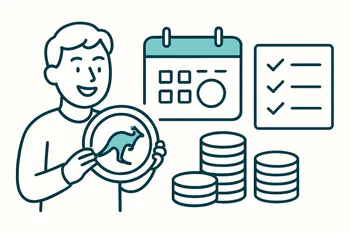Navigating Car Loans on the Sunshine Coast
- Personal Finance
- 04 Mins read

Understanding Car Loans on the Sunshine Coast
When considering a car loan on the Sunshine Coast, it’s vital to grasp some fundamental concepts. Car loans help you finance a vehicle by borrowing money that you repay over time, typically with interest. This process might seem daunting, especially for first-time buyers, but with the right information, you can navigate it smoothly.
Types of Car Loans
There are a few common types of car loans you might encounter:
Secured Car Loans: These loans require you to use the car as collateral. If you fail to make your payments, the lender can repossess the vehicle. However, because these loans are less risky for lenders, they often come with lower interest rates.
Unsecured Car Loans: In contrast, these loans don’t require collateral. The lender evaluates your creditworthiness instead. While it’s easier to qualify for these loans, they usually come with higher interest rates.
Novated Leases: A popular option for employees, this allows you to lease a car and have the payments deducted from your pre-tax salary. This can reduce your taxable income and potentially save you money.
Chattel Mortgages: Generally used by business owners, this option allows you to finance a vehicle while retaining ownership. You offset the interest against your business income.
How to Choose the Right Loan
Choosing the right car loan involves assessing your personal situation. Here are crucial factors to consider:
Interest Rates: Check various lenders for competitive rates. A lower interest rate can save you hundreds, if not thousands, over the life of the loan.
Loan Term: Shorter loan terms mean higher monthly payments but lower total interest paid. Conversely, longer terms lower monthly payments but increase the interest total.
Fees and Charges: Watch out for hidden fees such as setup charges, monthly fees, and early repayment penalties. These can significantly affect the overall cost of the loan.
Budget: Calculate what you can afford. Ensure that car loan payments fit comfortably within your monthly budget. Also, consider additional costs like insurance, fuel, maintenance, and registration.
The Application Process
Step 1: Gather Your Documents
You’ll need to provide proof of income, identification, and details about your financial situation. This may include bank statements and details about any existing loans or credit cards.
Step 2: Check Your Credit Score
Lenders will look at your credit score to determine how risky it is to lend you money. A higher score often results in better interest rates.
Step 3: Shop Around
Don’t settle for the first offer. Speak with multiple lenders and use comparison websites to see which deals are available.
Step 4: Pre-approval
Consider getting pre-approved for a loan. This can give you a better idea of how much you can borrow and what your monthly repayments will look like.
Tips for Securing a Loan
Improve Your Credit Score: If your score isn’t great, take some time to improve it. Pay off debts and avoid applying for new credit before you apply for your car loan.
Make a Larger Deposit: Saving for a larger deposit can reduce the amount you need to borrow, lowering your repayments and total interest paid.
Negotiate Terms: Don’t hesitate to negotiate terms with lenders. You might be able to secure a better interest rate or lower fees.
Understanding Interest Rates
Interest rates can be confusing, but they play a crucial role in how much you will pay for your loan. The interest rate is the cost of borrowing money, expressed as a percentage.
For example, on a $30,000 loan over five years, a difference of just 1% in the interest rate can lead to over $1,500 in extra payments. This is why it’s essential to compare rates carefully.
Hidden Costs to Watch For
While the monthly payment is important, it’s essential not to overlook additional costs. These can include:
- Insurance: Most lenders require comprehensive insurance on the vehicle.
- Maintenance: Regular service and unforeseen repairs can add up.
- Registration and Stamp Duty: These are recurring costs tied to vehicle ownership.
Case Study: The Smiths' Car Loan Journey
Let’s look at a hypothetical example of the Smith family, who are looking to purchase a new car:
- Car Price: $35,000
- Loan Term: 5 years
- Interest Rate: 5% for a secured loan
If the Smiths decide on a secured loan with a 5% interest rate, their monthly repayment would be around $660. Over five years, they will pay about $39,000 in total, including $4,000 in interest.
If they manage to secure a lower interest rate of 4%, their monthly repayments drop to approximately $644, saving them around $1,000 over the life of the loan. This example illustrates how even a small change in the interest rate can considerably affect your finances.
Guidelines from Financial Experts
According to the Australian Securities and Investments Commission (ASIC), following these guidelines can simplify your car loan experience:
- Research thoroughly: Understand the different loan types and options available to you.
- Don’t rush: Take your time to compare offers.
- Know your rights: Understand the contracts you sign and what it means for your financial obligations.
Getting Professional Help
If all this seems overwhelming, consider consulting a finance broker. In my ten years as a mortgage broker, I've seen how professional advice can save clients from costly mistakes. Brokers have access to various lenders and can help find the best deal for your situation.
Key Takeaways
- Understand Loan Types: Know the difference between secured and unsecured loans.
- Shop Around: Get quotes from various lenders to find the best rate.
- Calculate Total Costs: Look beyond monthly payments to understand the total cost of a loan.
- Seek Professional Advice: Don't hesitate to consult experts for tailored advice.
Conclusion
Navigating car loans on the Sunshine Coast doesn’t have to be complicated. With the right information and a clear understanding of your needs, you can confidently choose a loan that fits your financial situation. Take your time, compare options, and don't hesitate to ask for help when needed.
Happy car hunting! Remember, making informed decisions now can lead to significant savings in the future.



